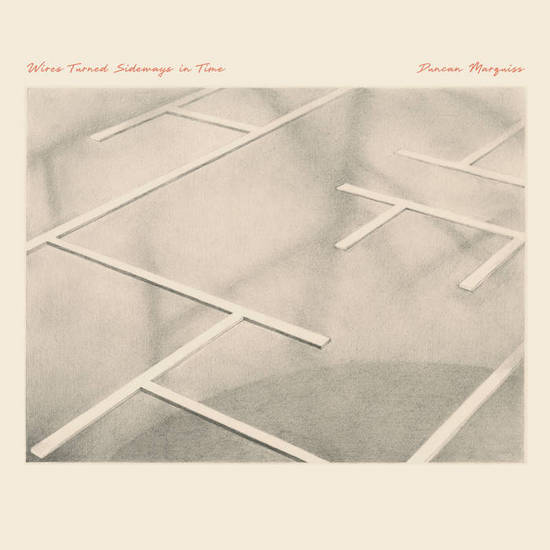With The Phantom Band, Duncan Marquiss made propulsive indie music, driven by dark, kosmiche-grade rhythms. On Wires Turned Sideways in Time, his first solo record, these tendencies are still very much in evidence, but his compositions also slip towards the acoustic guitar. He draws a thread between the resonant bass of guitarists such as Bert Jansch or Jim O’Rourke, and the gasoline groove of Cluster or Neu! The result is a filmic album of wide landscapes and wider inner spaces, where the epic is always personal.
‘Drivenhalle’, the opening track, is a statement of intent. At nine minutes thirty-eight seconds, it weaves a sweeping, Morricone-esque string melody over a thumping turbine beat, which drifts between electric and acoustic instruments. It is air-punchingly good. Some tracks have simple instrumental textures, including ‘Minor History’ on which a finger-picked acoustic guitar is unmoored by the eerie whistling of something that could be a distant theremin. The title track has glittering harp over a rubber ball bass drum, each sound distinct and of itself. ‘C Sweeps’ has both a delicate tune and a deeply fuzzy bass. ‘Fixed Action Patterns’ has an eerily beautiful guitar, joined by alarming metronome percussion that seems to be marking time before something bad happens.
On Wires Turned Sideways in Time Marquiss, who has written video scores for himself and others, reduces sound to the minimum needed to create a sense of place. We travel familiar landscapes that are, nevertheless, not quite the way we had imagined them. Marquiss was brought up in the Aberdeenshire countryside, and returned home to record the entire album in his parents’ garage. Marquiss’ playing is richly layered, both comforting and unsettling. The highly confident instrumentation is particularly remarkable as all the sounds were made by him alone, nearly all using only the guitar.
Also a professional visual artist, Marquiss’ work has played with the meaning of myth and landscape in a market-driven world. In this context, the essentially urban kosmiche music of the 1970s and the more rural folk tradition could both be seen as forms of nostalgia which have, by the 2020s, met somewhere in the middle. Separated from the urgent cultural contexts that originally generated them, they are now tools to express feelings about time and place. Who doesn’t hear Ry Cooder in their heads in a southern desert, or motorik when driving in the fast lane at night? With Wire Turned Sideways in Time Marquiss has produced a mature, enjoyable and highly impressive record, which may even help us reclaim the interior of our own heads.


